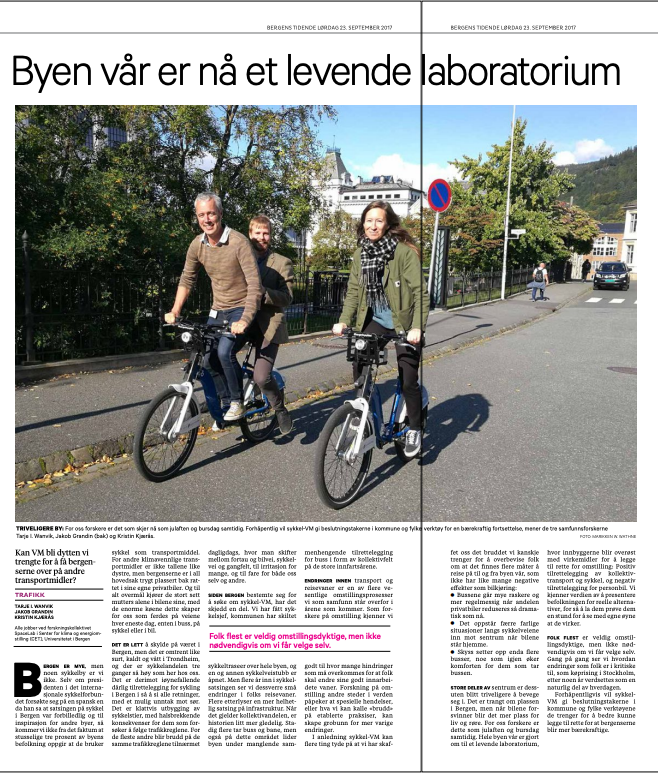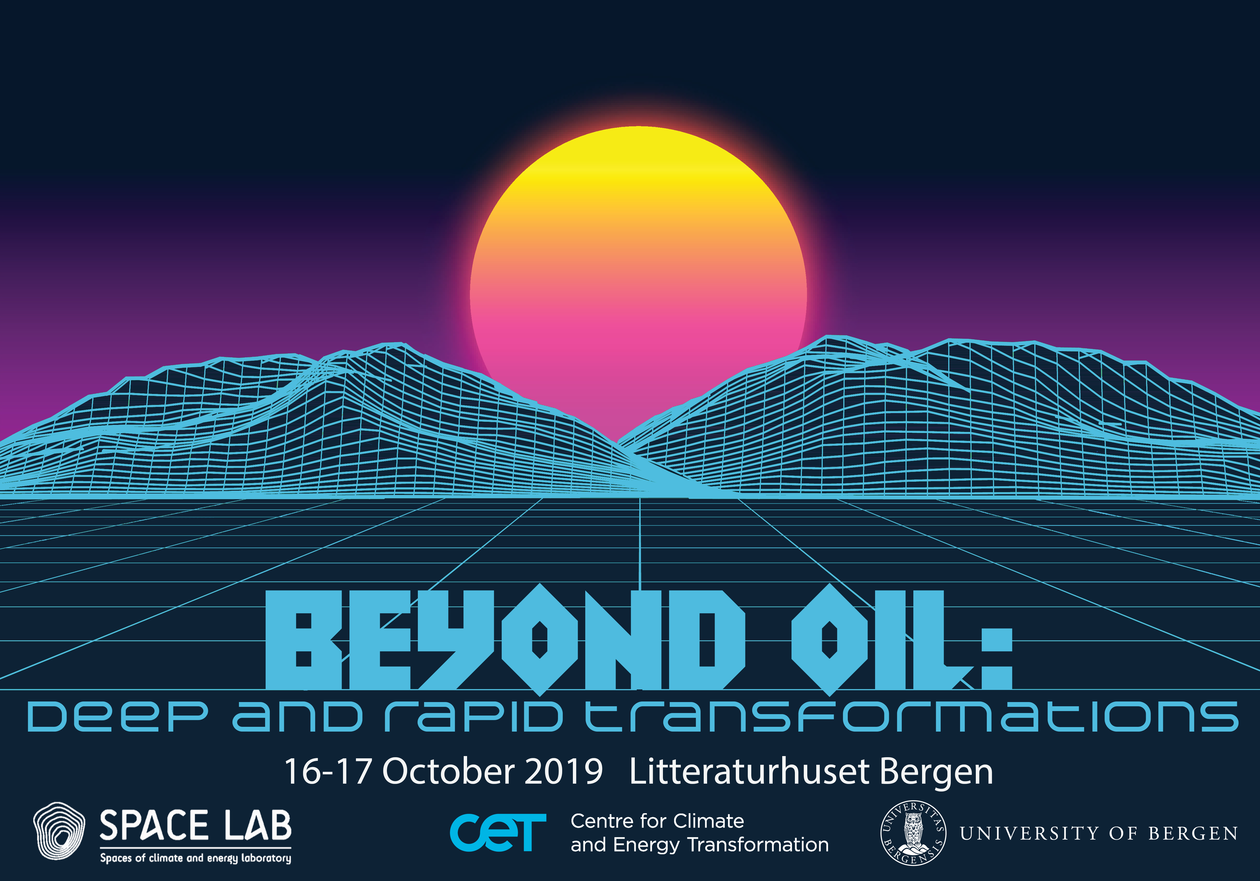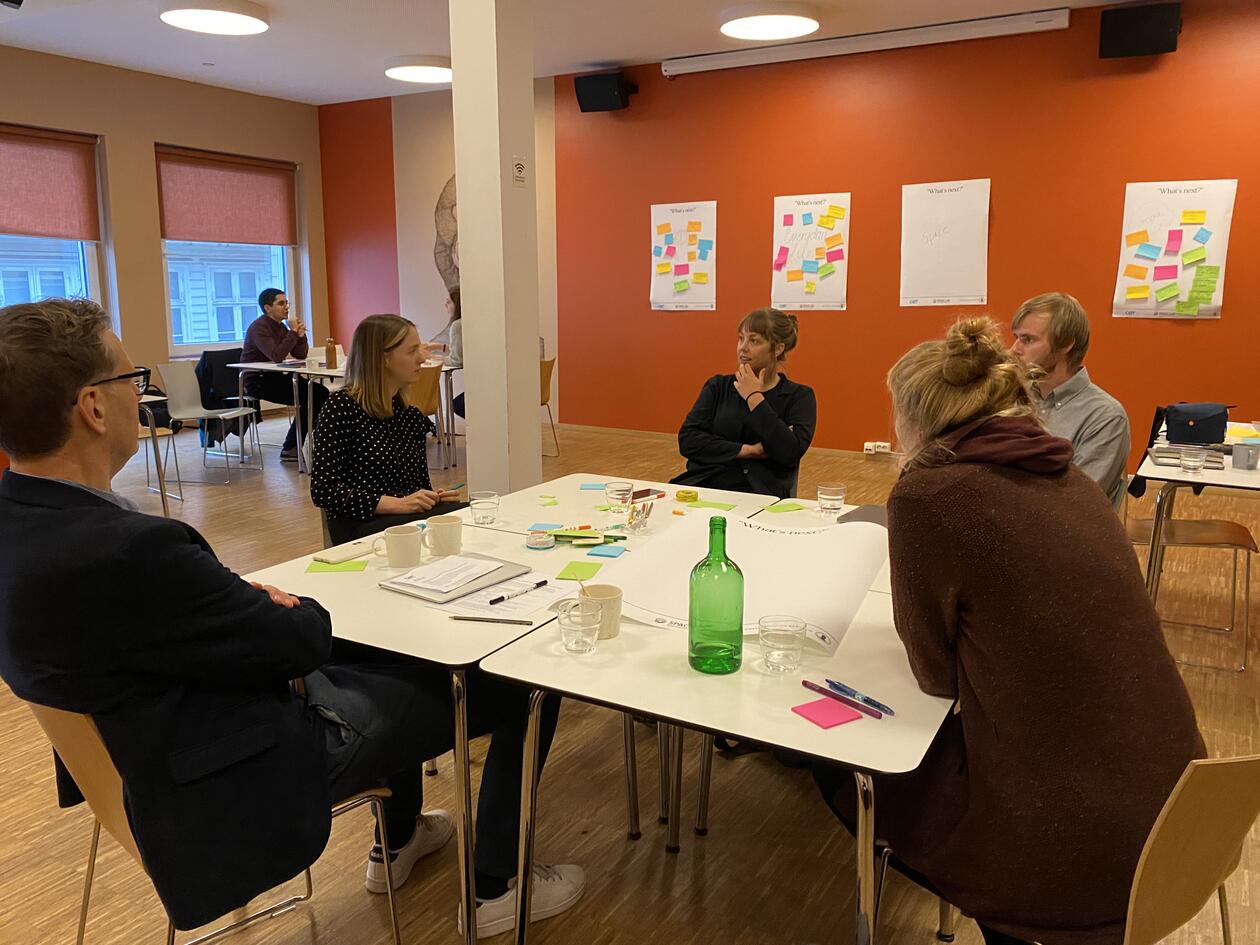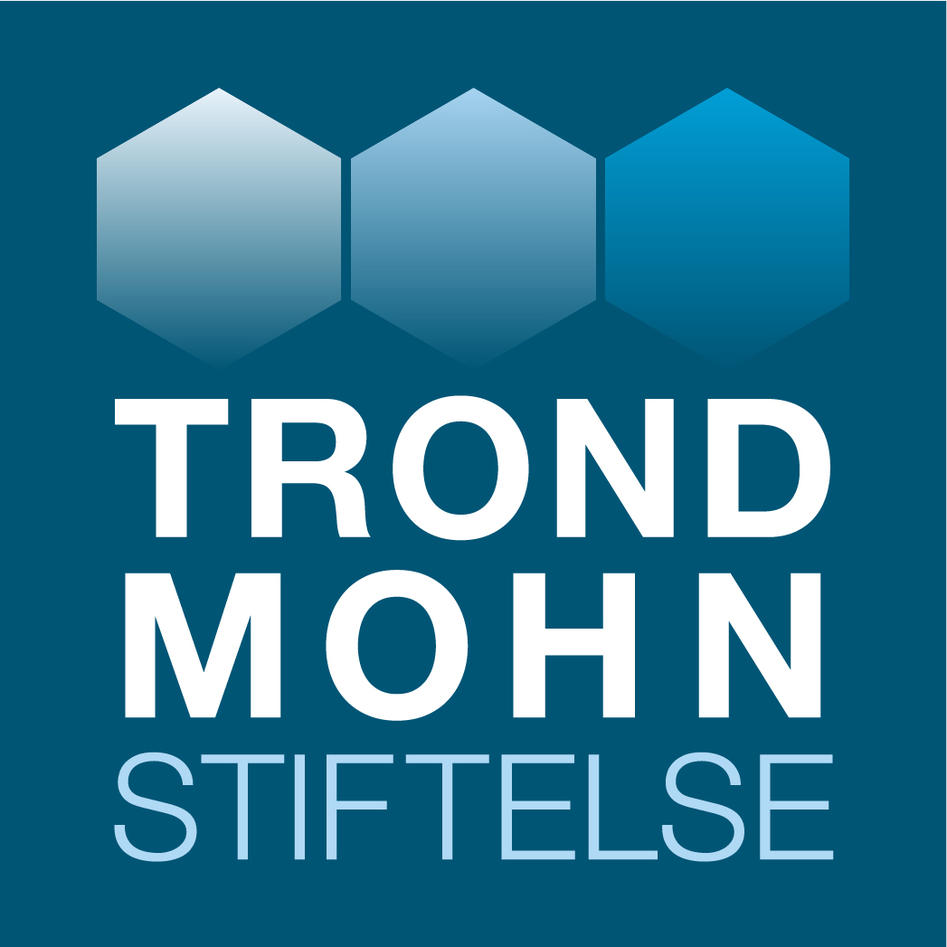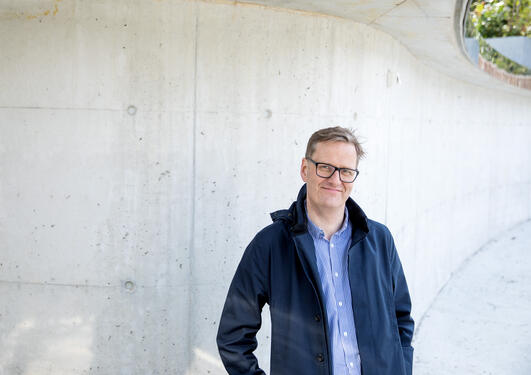Five years of the city as a living laboratory
The end of 2020 marked the close of our major project European cities as actors in climate and energy transformation project, funded by the Trond Mohn Foundation. Among the achievements, we are particularly proud of how the project has helped to develop the careers of researchers across the fields of sustainable city planning, governance, communications and media and social movements.

Hovedinnhold
The past four years have seen our ideas as a research group develop and progress, as we collectively worked to understand how cities think, how climate policies are networked and managed at the urban level, and ultimately - who is able and willing to make changes in our city?
When we started the project under the name SpaceLab in 2016, the world of sustainability research looked quite different from today, just under half a decade later. Though we started our research environment pre-Fridays for Future, there were signs that shifts in policy ideas and public narratives were beginning to take shape. As social scientists working in geography, we were equipped to think through these sudden ruptures and instabilities in political urban landscapes, from the local to international scales. At the end of the project it counts close to 50 scientific publications, with several more in process.
Likewise, we have dedicated our energies to publishing ideas about the role of the researcher and the academic institution in the climate transitions, each drawing on our own empirical knowledge to find clarity and nuance in sustainability debates. In this vein, we published Modes of engagement in climate and energy solutions in the journal Energy Research and Social Science (Haarstad et al., 2018) and have actively engaged in social media and popular press debates. Now more than ever is a good time for the social sciences to learn how to adapt to rapid changes in society – this project is a testament to the importance of creating the space and time to be able to develop ambitious ideas.
The project has been key in supporting the careers of researchers here at the University of Bergen. Through this funding, our own Håvard Haarstad went on to become Professor of Geography, and SpaceLab grew to become the Centre for Climate and Energy Transformation. Our post-doctorate fellow Tarje Wanvik used his time on the project to get out into the field and work for a local political party, and has subsequently become Research Leader at NORCE. Our post-doctorate fellow Siddharth Sareen, a leading expert in renewable energy transitions, is now Associate Professor in Energy and Environment at the Department of Media and Social Sciences at University of Stavanger and CET Associate Professor II. Our PhD recruits Kristin Kjærås and Jakob Grandin are now in the final stages of their doctorates, and research assistants Karin Lillevold, Marikken Wulff Wathne and Eleanor Johnson have moved onto positions elsewhere in the research sector.
The project has also funded our bi-annual “Beyond Oil” conference, where we invite some of the leading minds in sustainable transformations to deliver, debate and develop cutting-edge knowledge in energy and city governance.
As a group of researchers, we are committed to building a post-fossil fuel world and believe in acting and engaging at the local level to work with communities facing rapid change. We extend our gratitude to all of you who have taken part in our many workshops, seminars, events and writing initiatives these past four years.
Publications
The final report for the project was submitted to Trond Mohn Foundation on March 1, 2021. It listed 45 scientific publications published from the project at the time of the final report, and another 13 publications at advanced stage towards publication. The publications were mostly in geography journals, including the highest ranked journal in the field, in addition to interdisciplinary journals on sustainability and energy transitions.
Publications from the project:
1. Wanvik, T. and Haarstad, H. (accepted for publication) Populism, Instability and Rupture in Sustainability Transformations. Annals of the Association of American Geographers.
Sareen, S., and Haarstad, H. (accepted for publication). Decision-making and scalar biases in solar photovoltaics roll-out. Current Opinion in Environmental Sustainability.
Grandin, J. and Haarstad, H. (2021). Transformation as relational mobilisation: the networked geography of Addis Ababa’s sustainable transport in-terventions. Environment and Planning D: Society and Space. 2021;39(2):289-308.
Sareen, S., and Sagmo, J. 2021. Getting profitable CCU off the ground: Contingent pathwaysand Bergen Carbon Solutions. Frontiers in Energy Research 8: 541868. https://doi.org/10.3389/fenrg.2020.541868
Nordholm, A. and Sareen, S. 2021. Scalar containments of energy justice and its democratic discontents: Solar power and energy poverty alleviation. Frontiers in Sustainable Cities (in press). http://doi.org/10.3389/frsc.2021.626683 6.
Bisello, A., Vettorato, D., Haarstad, H., Borsboom-van Beurden, J. (Eds.). 2021. Smart and Sus-tainable Planning for Cities and Regions: Results of SSPCR 2019. Springer International Pub-lishing. https://www.springer.com/gp/book/9783030573317
Grandin, J and Sareen, S. 2020. What sticks? Ephemerality, permanence and local transition pathways. Environmental Innovation and Societal Transitions 36: 72- 82. https://doi.org/10.1016/j.eist.2020.04.008
Sareen, S. 2020. Metrics for an accountable energy transition? Legitimating the governance of solar uptake. Geoforum 114: 30-39. https://doi.org/10.1016/j.geoforum.2020.05.018
Tvinnereim, E., Haarstad, H., Rødeseike, A., & Bugnion, V. 2020. Explaining public acceptance of congestion charging: The role of geographical variation in the Bergen case. Case Studies on Transport Policy, 8(3): 922-1001. https://doi.org/10.1016/j.cstp.2020.04.007
Sareen, S., and Grandin, J. 2020. European green capitals: Branding, spatial dislocation or cat-alysts for change? Geografiska Annaler B: Human Geography 102 (1): 101- 117. https://doi.org/10.1080/04353684.2019.1667258
Sareen, S., Thomson, H., Tirado Herrero, S., Gouveia, J., Lippert, I., and Lis, A. 2020. European energy poverty metrics: Scales, prospects and limits. Global Transitions 2: 26- 36. https://doi.org/10.1016/j.glt.2020.01.003
Sareen, S. and Haarstad, H. 2020. Legitimacy and accountability in the governance of sustain-able energy transitions. Global Transitions 2: 47- 50. https://doi.org/10.1016/j.glt.2020.02.001
Martiskainen, M., Axon, S., Sovacool, B., Sareen, S., Del Rio, D. and Axon, K. 2020. Contextual-izing climate justice activism: Knowledge, emotions, motivations, and actions among climate strikers in six cities. Global Environmental Change, 65, p. 102180. https://doi.org/10.1016/j.gloenvcha.2020.102180
Moss, T. and Sareen, S. 2020. Demanding demand: Political configurations of energy flexibil-ity in Berlin, 1920-2020. Journal of Energy History, 5. http://energyhistory.eu/node/230
Silva, L. and Sareen, S. 2020. Solar photovoltaic energy infrastructures, land use and sociocul-tural context in Portugal. Local Environment, 1- 17. https://doi.org/10.1080/13549839.2020.1837091
Fell, M., Pagel, L., Chen, C., Goldberg, M., Herberz, M., Huebner, G., Sareen, S. and Hahnel, U. 2020. Validity of energy social research during and after COVID-19: challenges, considera-tions, and responses. Energy Research & Social Science,
101646. https://doi.org/10.1016/j.erss.2020.101646
Sareen, S. 2020. Social and technical differentiation in smart meter rollout: Embedded scalar biases in automating Norwegian and Portuguese energy infrastructure. Humanities and So-cial Sciences Communications, 7(25): 1-8. https://doi.org/10.1057/s41599-020-0519-z
Kjærås, K. 2020. Towards a relational conception of the compact city. Urban Studies, 1-17.
Silva, L. and Sareen, S. 2020. Solar photovoltaic energy infrastructures, land use and sociocultural context in Portugal. Local Environment: The International Journal of Justice and Sustain-ability (in press). https://doi.org/10.1080/13549839.2020.1837091
Martiskainen, M. Axon, S., Sovacool, B., Sareen, S., et al. (2020) Contextualizing climate jus-tice activism: Knowledge, emotions, motivations, and actions among climate strikers in six cities. Global Environmental Change 65. 102180. https://doi.org/10.1016/j.gloen-
vcha.2020.102180
Moss, T, and Sareen, S. (2020) Demanding demand: Political configurations of energy flexibil-ity in Berlin, 1920-2020. Journal of Energy History/Revue d’Histoire de l’Énergie [Online] 5. http://energyhistory.eu/en/node/230
Grandin, J. and Sareen, S. 2020. What sticks? Ephemerality, permanence and local transition pathways. Environmental Innovation and Societal Transitions, 36: 72-82.
https://doi.org/10.1016/j.eist.2020.04.008
Tvinnereim, E., Haarstad, H., Rødeseike, A., & Bugnion, V. 2020. Explaining public acceptance of congestion charging: The role of geographical variation in the Bergen case. Case Studies on Transport Policy, 8(3): 922-1001. https://doi.org/10.1016/j.cstp.2020.04.007
Sareen, S. and Haarstad, H. 2020. Energy transitions governance (Special issue). Global Tran-sitions, 2(March). Global Transitions | Energy Transitions Governance | ScienceDirect.com by Elsevier
Sareen, S. and Haarstad, H. 2020. Editorial: Legitimacy and accountability in the governance of sustainable energy transitions. Global Transitions, 2, 47-50.
https://doi.org/10.1016/j.glt.2020.02.001
Karvonen, A., Cook, M., Haarstad, H. 2020. Urban planning and the smart city: Projects, prac-tices and politics. (Special issue) Urban Planning 5(1). Vol 5, No 1 (2020) | Peer-Reviewed Open Access Journal | Cogitatio Press
Wathne, M., and Haarstad, H. 2020. The smart city as mobile policy: insights on contempo-rary urbanism. Geoforum, 108: 130-138. https://doi.org/10.1016/j.geoforum.2019.12.003
Haarstad H. (2020) Do Climate Targets Matter? The Accountability of Target-setting in Urban Climate and Energy Policy. In: Sareen S. (ed.) Enabling Sustainable Energy Transitions. Pal-grave Pivot. https://link.springer.com/chapter/10.1007/978-3-030-26891-6_6
Sareen S., editor (2020) Enabling Sustainable Energy Transitions. Palgrave Pivot.
https://link.springer.com/book/10.1007/978-3-030-26891-6
Sareen & Grandin (2019). European green capitals: branding, spatial dislocation or catalysts for change?, Geografiska Annaler B: Human Geography, 102(1): 101-117.
https://doi.org/10.1080/04353684.2019.1667258
Haarstad, H. and Wathne, M. W. 2019. Are smart city projects catalyzing urban energy sus-tainability? Energy Policy, 129: 918-925. https://doi.org/10.1016/j.enpol.2019.03.001
Wanvik, T. I. 2019. Ei urban verd. I: Verda og vi. Innføring i geografi. Det Norske Samlaget. https://samlaget.no/products/verda-og-vi-1
Haarstad, H. og Wathne, M. 2019. Smartere byer - smartere liv? I: Rolstadås, A. et al. Det nye digitale Norge. John Grieg Forlag: Norges Tekniske Vitenskapsakademi.
Lillevold, K. and Haarstad, H. 2019. The deep city: Cultural heritage as a resource for sustaina-ble local transformation. Local Environment, 24(4): 329-341.
https://doi.org/10.1080/13549839.2019.1567481
Grandin (2019). Klimatet och framtiden som inte kan börja. Røyst 11.
http://www.royst.no/11-klimatet-och-framtiden-som-inte-kan-borja/
Bouzarovski, S. and Haarstad, H. 2019 Rescaling low-carbon transformations: towards a rela-tional ontology. Transactions of the Institute of British Geographers, 44(2): 256-269. https://doi.org/10.1111/tran.12275
Sareen, S., and Haarstad, H. 2018. Bridging socio-technical and justice aspects of sustainable energy transitions. Applied Energy, 228, October: 624-632.
https://doi.org/10.1016/j.apenergy.2018.06.104
Grandin, J. (2018). Translokala utvecklingsstigar: relationell politik i Oslos Bilfritt byliv. In An-dersson, I. (ed.) Globala flöden och lokala praktiker – rörliga policys i tid och rum. Stockholm: Svenska sällskapet för antropologi och geografi
Haarstad, H., Sareen, S., Wanvik, T., Grandin, J., Kjærås, K., Oseland, S., Kvamsås, Lillevold, K., and Wathne, M. 2018. Transformative social science? Modes of engagement in climate and energy solutions. Energy Research and Social Science, 42, August: 193-197.
https://doi.org/10.1016/j.erss.2018.03.021
Haarstad, H and Wathne, M. 2018. Smart cities as strategic actors: Insights from EU Light-house projects in Stavanger, Stockholm and Nottingham. In: Karvonen., A, Cugurullo F., and Caprotti, F. (eds). Inside Smart Cities: Place, Politics and Urban Innovation, London: Routledge. https://www.routledge.com/Inside-Smart-Cities-Place-Politics-and-Urban-I...
Haarstad, H. and Rusten, G. (eds) 2018. Grønn omstilling: norske veivalg [Green transforma-tion: Norwegian Pathways] Oslo: Universitetsforlaget. https://www.universitetsforla-
get.no/nettbutikk/gronn-omstilling-norske-veivalg-uf.html
Oseland, S., Haarstad, H. 2018. Norske byers rolle i grønn omstilling: hva gjør vi med målkon-fliktene? I: Grønn omstilling: norske veivalg, redigert av Haarstad, H. og Rusten, G. Oslo: Uni-versitetsforlaget, 63-78. https://www.universitetsforlaget.no/nettbutikk/gronn-omstilling-norske-v...
Grandin, J., Haarstad, H., Kjærås, K., Bouzarovski, S. 2018. The Politics of Rapid Urban Trans-formation. Current Opinion on Environmental Sustainability, 31: 16-22.
https://doi.org/10.1016/j.cosust.2017.12.002
Grandin, J. 2018. Translokala utvecklingsstigar: relationell politik i Oslos Bilfritt byliv. I: Glo-bala flöden och lokala praktiker : - policymobilitet i tid och rum. http://ymer.bokorder.se/en-us/Book/3481/globala-floden-och-lokala-praktiker
Haarstad, H. 2017. Constructing the sustainable city: The role of sustainability in the 'smart city' discourse. Journal of Environmental Policy and Planning, 19(4): 423-437.
https://doi.org/10.1080/1523908X.2016.1245610
Haarstad, H, and Wanvik, T. 2017. Carbonscapes and beyond: conceptualizing the instabilities of oil landscapes. Progress in Human Geography, 41(4): 423-450.
https://doi.org/10.1177%2F0309132516648007
Haarstad, H. and Oseland. S. 2017. Historicizing urban sustainability: the shifting ideals be-hind Forus Industrial Park, Norway. International Journal of Urban and Regional Research, 41(5): 838-854. https://doi.org/10.1111/1468-2427.12551

